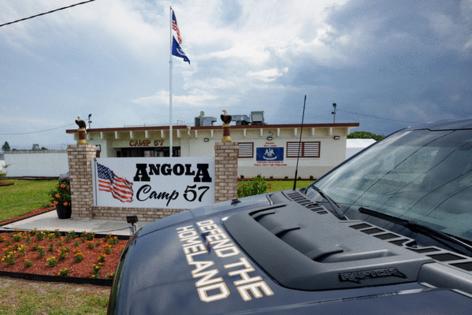Trump migrant detentions extending to notorious Louisiana prison
Published in News & Features
WASHINGTON — On a sweep of farmland hemmed in by the Mississippi River, where guards on horseback once watched over inmates picking cotton, officials on Wednesday proclaimed a new mission for one of America’s most notorious prisons.
A corner of the sprawling Louisiana State Penitentiary, better known as Angola, will now house “Camp 57,” a federal detention center for migrants deemed the most serious offenders, part of President Donald Trump’s mass deportation campaign.
The administration said the facility would provide about 400 beds and described it as part of a broader endeavor to expand detention capacity. It is one of more than 60 new federal, state and local facilities added to the immigration system this year as Immigration and Customs Enforcement tries to meet a daily arrest quota of 3,000 people. The Justice Department, however, has denied in court filings that such a quota exists.
“This facility is fulfilling the president’s promise of making America safe again,” Louisiana Gov. Jeff Landry said, adding that it’s “giving ICE a facility to consolidate the most violent offenders into a single deportation and holding facility.”
Together, the new network adds thousands of beds mostly across Republican-led states, from Florida’s Everglades — where the so-called Alligator Alcatraz camp was shut down by a federal judge weeks after it opened for skipping an environmental review — to Indiana, where the “Speedway Slammer” added 1,000 beds through a state partnership.
Congress in July approved more than $150 billion for Trump’s immigration agenda — part of the president’s “Big, Beautiful Bill.” The measure tripled ICE’s budget, provided for new detention centers and border barriers, and created incentives for hiring thousands of new enforcement officers.
Administration officials have presented the expansion as proof they can move quickly to support Trump’s pledge of the largest deportation campaign in American history.
“With a rate of arrests and deportations as high as it’s been, we need all the help that we can get to increase our detention space,” said Kristi Noem, the Homeland Security secretary.
Angola, in the northwest corner of the state near the Mississippi border, has long been known as the “Alcatraz of the South.” It houses more than 4,300 inmates, with roughly 70% of them serving life sentences and more than 90% convicted of violent crimes — a higher share than any other Louisiana prison.
Angola’s notoriety arose from decades of violence and forced labor. In 1951, dozens of men cut their Achilles tendons in protest against work in the cotton fields, and they became known as the “Heel String Gang.” By the 1970s, stabbings were so common the prison was called the bloodiest in America. Field work continues today, often in punishing heat, and Angola has become a paradoxical tourist attraction with its prison rodeo and guided tours.
On its web page, the prison calls its reputation for violence outdated and says the tours “serve to educate the public on the history of the prison as well as the current reentry, rehabilitative and moral initiatives implemented over the last several decades which helped to transform Louisiana State Penitentiary from ‘the bloodiest prison in America’ to a model prison for onsite faith-based and vocational training curriculums.”
In July, Landry, a Republican, issued an order declaring a state of emergency at Angola’s Camp J, a unit closed since 2018. The camp, according to the order, had decayed to such an extent that it created a “significant threat of injury.” Emergency repairs were authorized, which cleared the way for the unit’s conversion into a federal detention site.
Officials said Angola provides a faster way to add detention space instead of constructing new facilities. Unlike “Alligator Alcatraz,” which was built in eight days at a cost of more than $300 million, Angola has high-security, fortified infrastructure, including triple barricades of razor wire, armed watchtowers and lockdown units. It will “hold 208 criminal illegal aliens by mid-September, 51 of whom are here today, and we will have the capacity to hold over 400 in the next few months,” Landry said.
ICE policy describes detention as “non-punitive,” with custody decisions made case-by-case based on flight risk, national security and public safety. The use of Angola, critics argue, tests that definition by placing civil detainees in a prison designed for the state’s most violent offenders.
“Angola’s dark history of abuse, deprivation, and repression is almost singular,” said Eunice Hyunhye Cho, senior counsel of the National Prison Project at the American Civil Liberties Union. “The law, at least, has hewed to the idea that immigration detention is civil and is not punitive in nature.”
During the first six months of Trump’s second term, migrant arrests more than doubled to about 92,000, compared with the final six months of the Biden administration.
About 37% of ICE arrests in July were of people with no US criminal convictions or pending charges, according to data compiled by the University of California at Berkeley’s Deportation Data Project. That’s up from 13% in December, the last full month of the Biden presidency.
____
(With assistance from Alicia A. Caldwell.)
©2025 Bloomberg L.P. Visit bloomberg.com. Distributed by Tribune Content Agency, LLC.







Comments